2
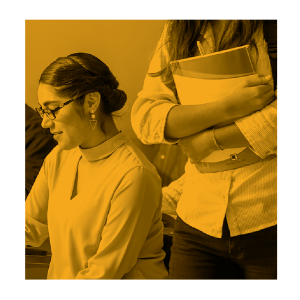
The Academic category refers to how the SDGs are embedded in learning and teaching, faculty and curriculum development, co-curricular student experiences, and place-based experiential learning.
Niagara College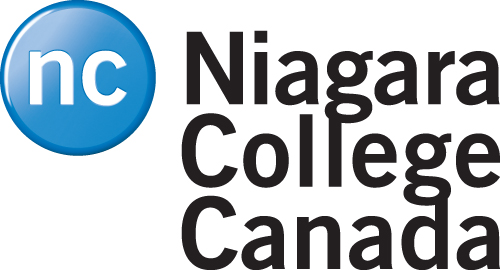 creates a UN Sustainable Development Goal Module
creates a UN Sustainable Development Goal Module
Niagara College – Ontario, ON
Project Name: NC UN Sustainable Development Goal Module
SDGs: All
Equity, Diversity and Inclusion: Yes
Project duration: Ongoing
Functional Category: Academic
Together with the Centre of Academic Excellence, NC Sustainability created a module for staff and students to explore and learn about the Sustainable Development Goals, and their specific application at Niagara College.
In the Introduction to the Sustainable Development Goals module, you’ll learn about the SDGs and the initiatives that are already contributing to progress towards achieving the SDGs. You’ll also gain tips as to how your organization, as well as how individuals, can start taking action whether that be in your studies, your work, or your day-to-day life.
This module has also aided in the development of additional modules for the new Niagara College Institute for Global Education and Training, and has been included in predeparture training for all Be World Ready participants.
Stakeholders Involved: NC Sustainability, Centre of Academic Excellence
Project Lead: Taryn Wilkinson, Manager, Sustainability, tawilkinson@niagaracollege.ca
More info: https://www.niagaracollege.ca/sustainability/unsdg/

Selkirk College library developed a Guide on Sustainable Development Goals
Selkirk College – Castlegar, BC
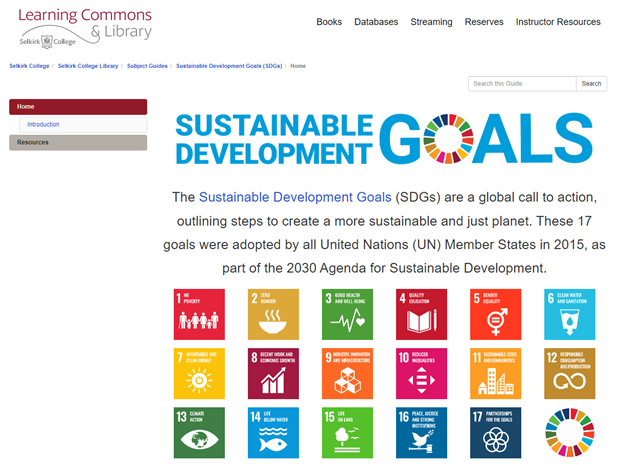
Project: SDG “LibGuide“
SDGs: 4
Project duration: Ongoing
Functional Category:Academic
The Selkirk College library partnered with sustainability staff to develop a new LibGuide dedicated to the Sustainable Development Goals. This online depository is now home to a growing collection of websites, videos, courses, podcasts and teaching materials. It is seen as a living resource that can continually expand.
This initiative contributes to SDG 4 Quality Education
Project Lead: Laura Nessman, Sustainability Coordinator, sustainability@selkirk.ca
More info: SDG Lib

Fanshawe College hosted Unbound Talks as part of the United Nations’ (UN) Sustainable Development Goals (SDGs) Week
Fanshawe College – London, ON
Project: Unbound Fashion Design – Sustainable fashion, gender fluidity and water protection
SDGs: 5, 13
Project duration: January 2023- June 2023
Project budget: $30,000
Functional Category: Academic ; Student and Community
Unbound is a unique and vibrant fashion event that celebrates Fanshawe College’s Fashion Design program graduates, with support from students in other programs.
On March 9, 2023, Fanshawe College hosted Unbound Talks as part of the United Nations’ (UN) Sustainable Development Goals (SDGs) Week. The event took place from 7 p.m. to 9 p.m. EST at Fanshawe College in London, Ontario.
Unbound Talks aims to raise awareness and educate people about sustainability, gender fluidity, and water protection. It also intends to encourage thought-provoking conversations on these important topics. It will feature eminent speakers who will be sharing their knowledge and thoughts on the theme. The event will highlight Fanshawe fashion students’ work on the Up-cycled jean design to demonstrate sustainable fashion practices.
Loren Couto, the Creative Director of Unbound, stated that “This year’s sustainable fashion theme, ‘One Love,’ sends a message of oneness, compassion, love, and respect for all humans and our shared home, Earth. Fashion has always been an important way for people to define themselves, and as such, it can be a powerful tool to creatively express an emerging movement toward harmony, respect for our relationships with ourselves, with each other, and with nature. This year, designers have focused on integrating the United Nations’ sustainable development goals to improve gender equality and climate action.” Jacqueline Bradica, a student at Fanshawe, and a valuable team member of the Unbound Talks team, talked about the event and said, “The Unbound events are not only to showcase students’ work, but are also to provide education, specifically around sustainability, and the fashion industry, so it is very important for us to gather speakers together like this and to try to make people more aware of this important cause.”
Supported by Fanshawe Sustainability, Unbound Talks is a part of Fanshawe Fashion Design students’ capstone project Unbound.
Project Lead: Loren Couto, Creative Director Unbound – lcouto@fanshawec.ca
More info:
Instagram account: @unboundfashion

Langara College faculty members work with students to improve their communities through UN SDG Fellowship
Langara College – Vancouver, BC
Project: UN SDG Open Pedagogy Fellowship
SDGs: 11
Project duration: Summer 2021 – ongoing
Functional Category: Academic
The Langara UN SDG fellowship was a collaboration of different disciplines and different institutions. Each fellowship team designed three renewable assignments. A student showcase took place in which a select number of students presented on how they improved their communities and achieved global justice through open pedagogy using the UN SDG framework.
Stakeholders Involved: leadership, collaborating faculty, students
Project Lead: Mike Smith-Cairns, Instructor,geography – msmithcairns@langara.ca
More info: Please visit the fellowship program website

Engaging students at Kwantlen Polytechnic to become Agents of Change through the United Nations SDGs Open Pedagogy Fellowship
Kwantlen Polytechnic University – Surrey, BC
Project: United Nations Sustainable Development Goals Open Pedagogy Fellowship
SDGs: All
Project duration: May 2019 – ongoing
Functional Category: Academic
Employing the SDGs as a conceptual framework, this fellowship program is designed to assist faculty with creating renewable assignments (all of which will carry a Creative Commons license) to help students become agents of change in their own communities. Each fellowship team (which will include at least one faculty member from KPU and one faculty member from either Montgomery College in Maryland or Maricopa Community Colleges in Arizona) will design three renewable assignments during the Summer 2020 semester. A minimum of two renewable assignments will be deployed in the classes of each fellowship team during the subsequent academic year.
Stakeholders Involved: Staff members, senior leaders, students, partners, local community
Project Lead: Urooj Nizami, Open Education Strategist, urooj.nizami@kpu.ca
More info: Please visit the fellowship program website to view video testimonials from the inaugural fellows, along with the renewable assignments

Bow Valley’s online course Focusses on Indigenization, SDGs, Climate Change and Sustainable Jobs
Bow Valley College – Calgary, AB
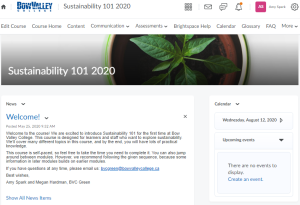
Project: Sustainability 101
SDGs: All
Project duration: Summer 2020
Functional Category: Academic
Sustainability 101 is a self-paced course on D2L that is open to staff and learners. When completed, individuals receive a certificate of completion, and students receive recognition on their co-curricular record. This course is being piloted for summer 2020, with the hope that it leads to sustainability being embedded across curricula in future years. Additionally, the college is considering making sustainability a college-wide learning outcome. The SDGs are woven throughout the course, along with a strong focus on Indigenous content (we worked with our Indigenization Curriculum Specialist). Individuals can self-register for the course through their D2L profile. Modules of the course include: Introduction to sustainability, Sustainable Development Goals, Climate change and sustainable jobs.
Stakeholders Involved: Staff, students, community partners
Project Lead: Amy Spark, Sustainability Coordinator, aspark@bowvalleycollege.ca
bvcgreen@bowvalleycollege.ca
 VIU Uses the SDGs for Community-based Interdisciplinary Teaching and Learning
VIU Uses the SDGs for Community-based Interdisciplinary Teaching and Learning
Vancouver Island University – Nanaimo, BC
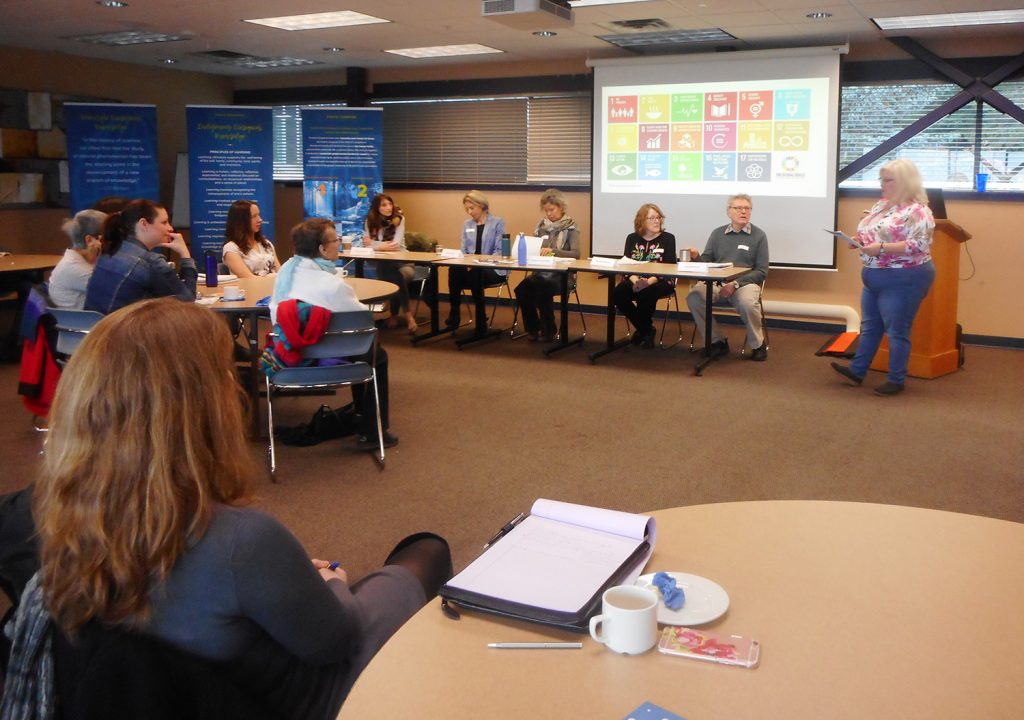
Project: Sustainability Across the Curricula Workshops
SDGs: 4, 7, 10, 11, 12, 13, 15, 17
Project duration: November 2017– ongoing
Functional Category: Academic
A subcommittee of the Sustainability Advisory Committee at VIU held two all-day meetings/ workshops to talk about how to further the integration of sustainability and SDGs into teaching and learning at VIU and to create a Summer (week-long) Institute on Society and Sustainability. This week-long plan would do community-based interdisciplinary programming aimed at students, professionals, and community members. This workshop brought together faculty, students, and community members to discuss steps to make VIU a leader in sustainable teaching and learning.
Faculty members interested in sustainability discovered what their peers are doing and found opportunities to collaborate – for instance, swapping lectures between chemistry and geography. Margot Croft (VIU sustainability resource person) led an exercise on what measures would motivate and support a sustainability lens at VIU. Among the suggestions was to develop a dedicated web portal profiling sustainability-oriented courses and research on campus. Another was to have a dedicated space for students and faculty to discuss sustainability on a formal and informal basis throughout the year.
Stakeholders Involved: Institutional staff, students, local community
Project Lead: Don Alexander, don.alexander@viu.ca; Margot Croft margot.croft@viu.ca

Seneca uses Fashion Design Courses to Teach the SDGs
Seneca College School of Fashion – Toronto, ON
Project: DSW512: Fashion Design V
SDGs: All
Project duration: Annually – September to April
Functional Category: Academic
DSW512 runs each September to December, during this time the student develops their collection via prototypes and fashion illustrations, which they present to a panel of industry at the beginning of December for feedback. For the Collection Intention students are asked “What SDGs align with their personal and brand values?” This encourages the student to consider these guiding principles in their collection development. In DSW615 – Fashion Design VI, running each January through to April, students move into the product development portion, where they create two looks, fitting on ‘live’ models week in preparation for the year end show and to include this work in their portfolio. Students are asked to include the SDGs on their final looks digital design boards. During year end fashion show that took place each April, an awards ceremony follows. The college features the students work, some completed and some in progress on Instagram. There were two sustainability awards for 2020, but it is also important to note that 7 of the nine award winners engaged in sustainable practices in some way (ie. zero-waste pattern design, upcycling, natural dyes, natural fibres, etc.)
Stakeholders Involved: Staff, students
Project Lead: Jennifer Dares, Jennifer.dares@senecacollege.ca; Zoran Dobric, zoran.dobric@senecacollege.ca
More info: Fashion Arts Seneca, Carol Francisco, Jamila Lyra Cavalcante Secche, Hyun Suk Lee Ellen, Trida Simone Easey, Charla Pope, Kailee Tones

Humber Faculty Champions Group shares practices for Integrating SDGs through a Community of Practice
Humber College – Toronto, ON
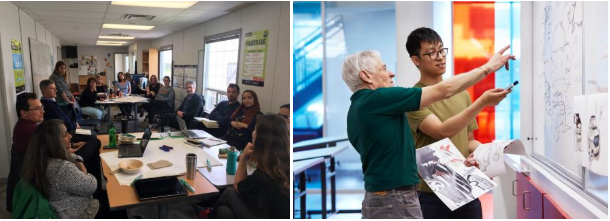
Project: Faculty Sustainability Champions
SDGs: 4, 17
Project duration: Almost 4 years, and ongoing
Functional Category: Academic
The Faculty Sustainability Champions (FSC) group is an open space for all (staff or faculty) to join gatherings throughout the year. These gatherings provide space for peer-to-peer learning, sharing and support in order to bring sustainability concepts and deeper learning into the student experience. Some people come looking to learn from others, some come to share what they have tried, what has worked and find ways to do it better. All are welcome: those who have limited knowledge to those who teach high level sustainability courses. This group evolved out of a Community of Practice hosted by the Innovative Learning Team and the Office of Sustainability in 2016. Since then, the group has developed teaching resources, supported the Humber Learning Outcomes and Sustainability Literacy Assessment, as well as upcoming sustainability staff training. The group has a Microsoft Teams group for sharing resources outside the gatherings. Faculty representation from each of Humber’s six academic faculties are involved, to support integrating sustainability concepts into all courses and programs and highlight the interconnectedness of sustainability. The SDGs are at the center of the conversations of this group. The FSC continues to build capacity and drive sustainability initiatives across the institution in terms of curriculum and teaching and learning practices.
Stakeholders Involved: faculty, teaching and learning staff, sustainability staff
Project Lead: Lindsay Walker Lindsay.Walker@humber.ca & Heidi Marsh Heidi.Marsh@humber.ca
More info: Faculty Sustainability Champions
 Centennial’s Senior Academic Leaders Champion SDG Innovation across the College
Centennial’s Senior Academic Leaders Champion SDG Innovation across the College
Centennial College – Scarborough, ON
Project: SDG Innovation Forum
SDGs: All
Project duration: January 2020 – Quarterly, Ongoing
Functional Category: Academic
The SDG Innovation Forum is a collaborative coalition of senior academic leaders to champion SDG innovation activity across the college and community. The forum meets once a quarter to take stock and leverage resources from all stakeholders with converging interests to help in building an ecosystem conducive to foster SDG innovation social entrepreneurship skills among students and community. The common objective is to facilitate the creation of experiential learning opportunities for students, empowering and equipping them with skills and tools to implement their own social entrepreneurship initiatives. The leaders come together aligning their interests to contribute collectively at the College community ecosystem level to achieve their converging interests for the benefit of students, colleges and the world, working on the principle of common interest for the greater good.
Stakeholders Involved: Institutional staff, institutional leadership
Project Lead: Lalit Guglani, BTech, MBA, Manager Scaleup Programs and Services Centre of Entrepreneurship lguglani@centennialcollege.ca
 Centennial uses the SDGs for Social Change and Globalizing the Curriculum
Centennial uses the SDGs for Social Change and Globalizing the Curriculum
Centennial College – Scarborough, ON
Project: Centre for Global Citizenship Education and Inclusion
SDGs: All
Project duration: September 2018 – ongoing
Functional Category: Academic, Student and community
The Centre for Global Citizenship Education and Inclusion supports quality education through inclusive and equitable education that promotes lifelong learning, delivered through the College’s unique Global Citizenship Education mandate. Over 92% of the College’s programs have integrated Global Citizenship and Equity learning outcomes across the diverse areas of study, which include curriculum related to the Sustainable Development Goals. In addition, the Centre has worked with student groups at the College, as well as youth groups internationally, with I Am a Global Citizen educational sessions, which include a critical SDG action planning activity to activate efforts towards achieving the SDG goals. The Centre for Global Citizenship Education and Inclusion is working with diverse industry partners to build capacity to integrate the principles of equity, diversity and inclusion. This initiative is based on sharing best practices to positively impact industry practices that integrate equity and inclusion, and to increase successful rates of graduate employment for students from historically marginalized communities. The Centre engages over 75 community partners annually from diverse industries to share expertise, knowledge and perspectives.
Stakeholders Involved: Institutional staff, institutional leadership, students, partners, local communities, private sector, others
Project Lead: Yasmin Razack: YRazack@centennialcollege.ca Silvia D’Addario: SDaddario@centennialcollege.ca
More info: Inclusive Workplace Practice Guide, Globally Networked Learning, Conversations for Social Change, Global Citizens Take Action, Global Citizens Get Hired
Kwantlen Polytechnic Uses the SDGs as a Framework for a Career Planning Course
Kwantlen Polytechnic University – Surrey, BC
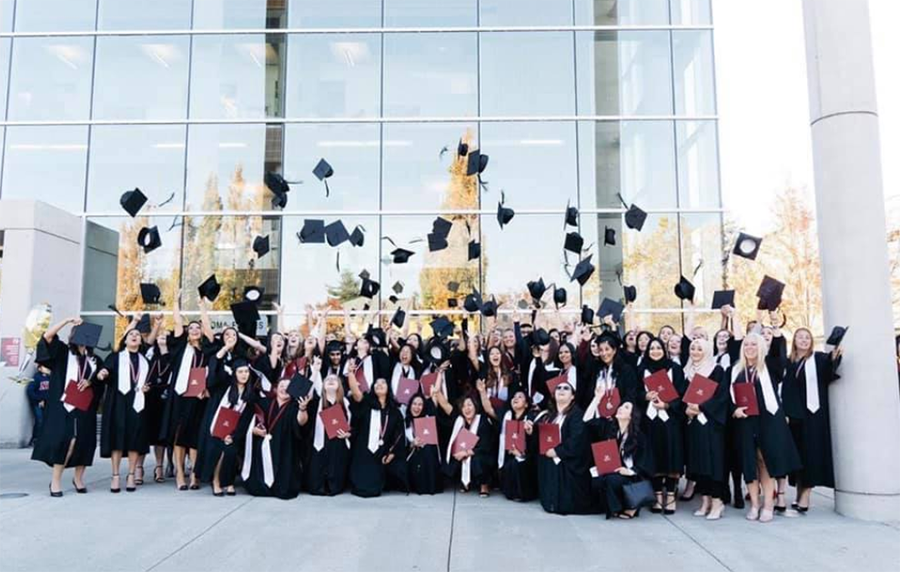
Project: Post-University Transition Course (EDUC 4100):
SDGs: All
Project duration: September 2019 – ongoing
Functional Category: Academic
EDUC 4100 (Post-University Transition) is a three-credit career transition course that incorporates the SDGs in its curriculum (e.g., assignments, reflections, presentations). A natural fit between career education and the SDGs was discovered, as students pondered three big questions that ought to be asked of all citizens if Canada wishes to mobilize everyone to meet the SDGs by 2030: What is the world that I want to live in? What do I see are the global problems that need our attention? What are my talents and experiences that may help address these problems, and in turn improve the condition of our world? Incorporating the SDGs in career education inspires students to consider not only their occupational aspirations, but also how these aspirations can be grounded on broader goal(s) that promotes a sustainable future for our “glocal” communities. Doing so also inspire people to think beyond their professions and adopt a lifelong career framework that addresses their identified SDG(s), which can transcend beyond the Decade of Action into the next SDGs iteration after 2030.
Stakeholders Involved: Institutional staff, students, partners, local communities
Project Lead: Candy Ho candy.ho@kpu.ca
More info: Post-University Transition
Humber Grounds Institutional Learning Outcomes in the SDGS
Humber College – Toronto, ON
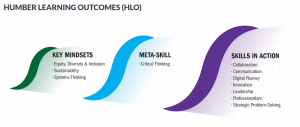
Project: Humber Learning Outcomes
SDGs: All
Project duration: December 2017 – December 2023
Functional Category: Academic
The Humber Learning Outcomes framework is part of Humber’s 2018-2023 Strategic Plan. In support of Humber’s strategic mission, the Humber community aims to represent its unique polytechnic identity through the development of global citizens who embody the knowledge and skills to lead and innovate. They describe the attributes – knowledge, skills, competencies, and values – that all students will possess upon graduation. The HLO framework includes three key mindsets that are crucial to the well-being and prosperity of individuals and communities: equity, diversity & inclusion (EDI), sustainability and systems thinking. The foundation of competencies for the Sustainability mindset is grounded in using the Sustainable Development Goals.
Stakeholders Involved: Staff members, senior leadership, students, partners, private sector
Project Lead: Lara McInnis, MA, OCELT Special Advisor, Institutional Learning Outcomes, Lara.McInnis@humber.ca
More info: HLO video, HLO
Fleming Hosts Multi-Disciplinary Workshops in Embedding the SDGs in Curriculum
Fleming College – Peterborough, ON

Project: Workshop: An Interdisciplinary Approach to Experiential Learning to Incorporate the SDGs & Address climate anxiety within post-secondary course design
SDGs: All
Project duration: Multi-year – AASHE designated Centers for Sustainability across the Curriculum are required to deliver at least one sustainability across the curriculum workshop per year, open to all other institutions.
Functional Category: Academic
In 2017, Fleming College was designated by the Association for Sustainability in Higher Education (AASHE) as a Center for Sustainability across the Curriculum. Therefore, for the past few years Fleming has offered workshops for faculty and sustainability staff in integrating the UN SDGs into curricular and co-curricular experiences. Both the 2019 and 2020 workshops drew participants from more than 20 institutions and showcased a variety of course-based examples of including the SDGs in learning and assessment activities. Faculty presented from a variety of disciplines (e.g. business, environmental science, early childhood education, career planning and indigenous studies programs). The workshops also showcased the ‘systems approach’ (at both Fleming and Humber college) to integrating sustainability using institutional learning outcomes across the curriculum. Fleming has also mapped the previously established institutional sustainability learning outcome to all 17 SDGs.
Annual workshops have been offered to faculty and staff from institutions across Canada and the US.
Stakeholders Involved: Staff, administration, faculty and partner institutions. The 2020 workshop was delivered virtually in June and brought in speakers from a number of Canadian Colleges and Institutions (i.e. Dawson College, Okanagan College, KPU, Humber College, Cambrian College and Fleming College). Participants were drawn from institutions across the US and Canada. The event was promoted and sponsored by AASHE through the Centers webpage.
Project Lead: Trish O’Connor, Director of Sustainability, Fleming College (formerly) now refer to Angela Stukator, Dean, General Arts and Sciences, Fleming College Angela.stukator@flemmingcollege.ca
More info: Sustainability across the curriculum, Sustainability in our courses
Durham College Journalism – Mass Media Students participate in a Digital Storytelling Exchange focused on the SDGs
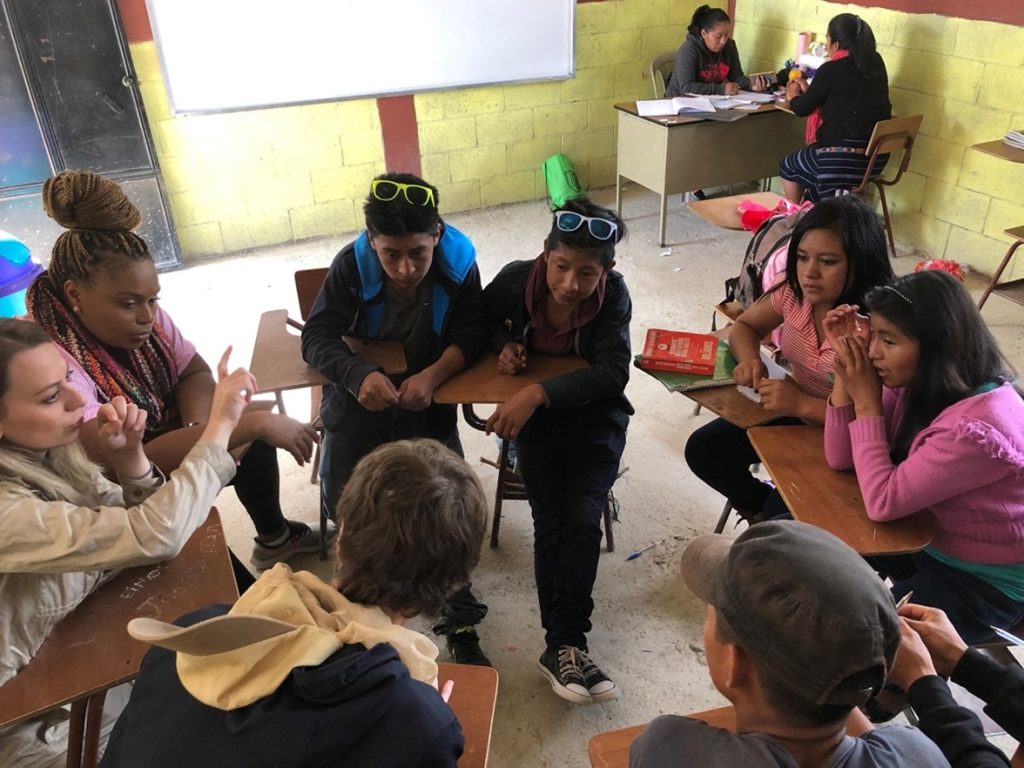
Durham College – Oshawa, ON
Project:
Faculty-led Classroom Abroad: Digital Storytelling Exchange (in-country)
Faculty-led Classroom Abroad (FLCA)@Home-Storytelling (virtual)
SDGs: All
Project duration: In-country: 10 days (October 2019 & February 2020); Virtual: October & November 2020
Functional Category: Academic
In October 2019 and February 2020, Journalism – Mass Media students from Durham College participated in a four-part FLCA that involved students abroad and at home. In Guatemala, eight students worked alongside Guatemalan youth to create short movies about the SDGs using only iPads. All students were also involved a worldwide discussion about the impact of the SDGs using DC’s state-of-the-art Global Classroom. As well, students spent 10 days filming and interviewing Guatemalans to document the progress being made by two communities to meet the SDGs.
Building on the success of the college’s Faculty-led Classrooms Abroad (FLCA) program and two previous FLCAs to Guatemala, students from across the School of Media, Art and Design participated in a four-part workshop series. Over the course of one month, students in Oshawa, Ontario mentored high school students in the rural Mayan community of Las Arrugas, Guatemala to produce media pieces – including podcasts, animations, photo essays, videos, and PR campaigns – that focused on the SDGs.
In both instances, the Guatemalan students found their voices to confront the challenges facing their communities, ranging from poverty, gender inequality and domestic violence to lack of clean drinking water and climate change. The Canadian students discovered parallels between their own lives and communities and became better listeners and storytellers as a result, while also strengthening their own media skills.
Stakeholders Involved: Staff members, senior leaders, students, partners, local community, private sector, other
Project Lead: Danielle Harder, Professor Journalism – Mass Media Danielle.Harder@durhamcollege.ca
More info: Durham College goes to Guatemala supporting the SDGs, DC students continue global initiatives during pandemic, Experiential Learning – Durham College in Guatemala, DC students win media awards for video and podcast produced in Guatemala

Cegep Gaspésie et des Iles incorporates the SDGs into high level ESL classes
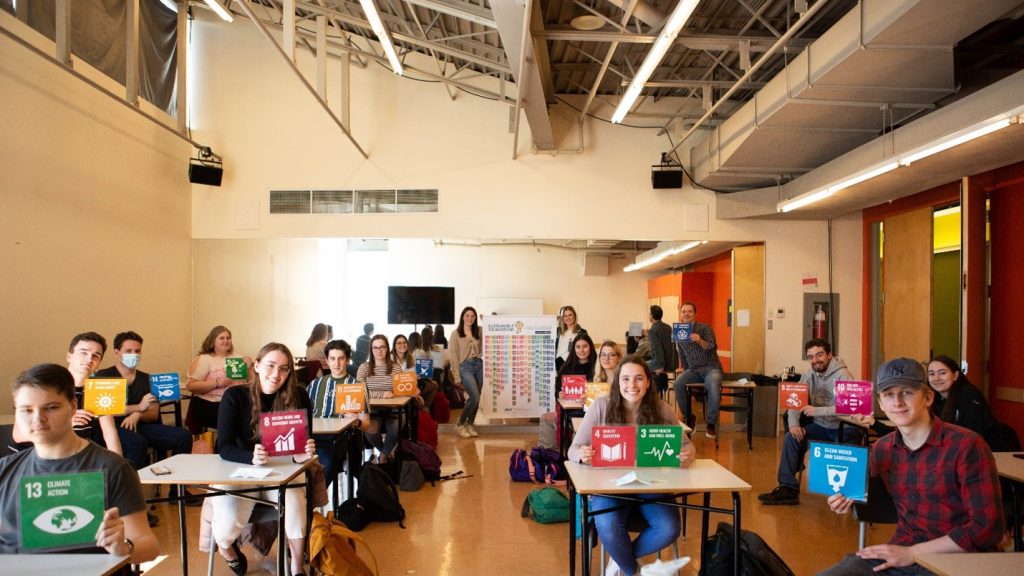 Cégep de la Gaspésie et des Iles – Gaspé, QC
Cégep de la Gaspésie et des Iles – Gaspé, QC
Project Name: Implementing the SDG’s in a career exploration project
SDGs: All
Project duration: 15 weeks (length of a cégep semester)
Functional Category: Academic
We spend the first 7 weeks working on the SDG’s, then the students work on their project for the remaining 8 weeks. Each student must choose one or more of the SDG’s linked with their future career. It can be a problem to solve, a new technique or development in their field of study. They have three elements to include: Research on the topic, an interview with a professional and they must participate in or create an activity connected to their SDG and their project and present it to someone in the community (school, organization, business, etc.). At the end of the semester, the students must hand in a written report and do an oral presentation.
Stakeholders Involved: Students, teachers, local community and the private sector.
Project Lead: Steven Parent ESL teacher, StevenParent@cegepgim.ca
More info: Cégep de la Gaspésie et des Îles UNEVOC Centre SDG in class student testimonial
 SDG at BCIT
SDG at BCIT
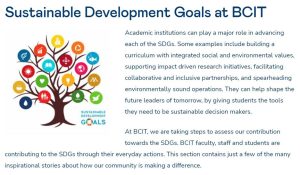
British Columbia Institute of Technology (BCIT) – Burnaby, BC
Project Name: Aligning the Sustainable Development Goals (SDGs) at BCIT
SDGs: All
Project duration: August 2021 – March 2022 (estimated completion)
Functional Category: Academic
At BCIT, we are taking steps to assess our contribution towards the UN Sustainable Development Goals(SDGs). BCIT faculty, staff and students are contributing to various SDGs throughout their everyday actions. To shed a spotlight on this, our team has created a series of web pages, highlighting how the 17 goals are being addressed at our institution. The web pages contain just a few of the many inspirational stories of how our community is making a difference – from academic endeavors and applied research, to engagement initiatives and campus operations.
The process:
- In March 2021, the British Columbia Institute of Technology (BCIT) submitted its first Sustainability Tracking, Assessment, Rating System (STARS) report.
Having aligned some of our responses with SDGs throughout the reporting process, we began to realize the opportunity that our STARS submission presented in aligning BCIT’s efforts with the 17 goals. - Using our submission, we began analyzing which goal(s) were addressed throughout our report content.
- STARS Aligned: Using the Sustainability Tracking Assessment & Rating System to Report on Contributions to the U.N. Sustainable Development Goals was heavily consulted throughout the alignment process.
- The information we found was combined and posted on a SDG web page, hosted under BCIT’s sustainability website, to demonstrate our commitment.
SDG mapping:
- Having quickly realized the interconnectedness of SDG initiatives on campus, our team created an SDG map.
- This map links various SDG initiatives at BCIT with one another and will act as a guide as we continue featuring more content on our web pages.
Stakeholders Involved: Staff members
Project Lead: Christine Pinkham, Project Manager, AASHE STARS
Supporting Staff: Mariya Chugay, Sustainability Specialist
More info: http://www.bcit.ca/sustainability/sdgs-at-bcit/\
